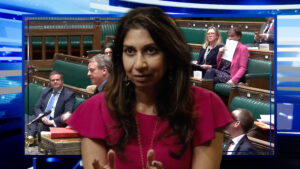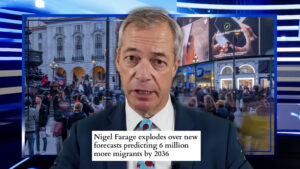INTRODUCTION
In recent years, the United Kingdom has faced significant challenges related to population growth and cultural shifts, which have ignited debates on the preservation of British values. Prominent figures, such as Suella Braverman, Alex Phillips, Douglas Carswell, and Nigel Farage, have voiced concerns over policies that have shaped this growing issue, with a particular focus on immigration, social liberalism, and the erosion of national identity. This article explores the impact of these forces and the urgent need for cultural preservation in the face of increasing pressure on Britain’s traditional values and institutions.
The Crisis of Leadership and Policy Failures
Suella Braverman, UK Member of Parliament, made a bold admission: “I’m sorry because my party has let you down.” This statement underscores the frustration many feel toward the government’s failure to effectively address issues related to immigration, social policy, and the undermining of British culture. Braverman highlights the systemic problem of governments adopting socially liberal policies that have led to unintended and damaging consequences. One of her primary concerns revolves around the increasing influence of the so-called “progress flag,” a symbol of inclusivity and progressive values that, in her view, has alienated conservative factions within society.

Braverman candidly admits her failure to prevent the progress flag from being flown from government buildings and institutions such as the NHS and the police force. Her stance against this symbol stems from a deeper belief that these policies have resulted in cultural erosion, stripping away British values that once unified the nation.
The Immigration Debate and Cultural Compatibility
One of the central themes in this discourse is the correlation between rising immigration and its cultural impact on the UK. Alex Phillips, former UK Member of Parliament, voices a growing concern among many Britons: Why is it acceptable for immigrants to preserve their cultural practices, yet British people are shamed for wanting to protect their own? Phillips decries the narrative that Britain should apologize for its colonial past and historic wrongdoings, while diverse cultural groups are celebrated at the expense of native British traditions.

This debate takes on a darker tone when discussing the societal impact of migration from countries with different cultural values. Phillips and Braverman both cite evidence of increasing sexual assaults linked to migrants from the Middle East and North Africa, suggesting that the cultural differences in attitudes toward women have contributed to this disturbing trend. The conversation around grooming gangs, particularly in northern England, brings to light a tragic failure of the authorities, who, due to political correctness, turned a blind eye to these abuses.
Population Growth and Its Strain on Resources
Perhaps the most pressing concern raised by Nigel Farage is the rapid population growth fueled by immigration. From 1997 to today, the UK population has ballooned from 58 million to 68 million, with 85% of that growth attributed to immigration policies enacted by both the Labour and Conservative governments. Farage points to the tangible consequences: an overwhelmed NHS, a housing crisis, and an increasingly unaffordable property market.

The strain on public services is undeniable. With nearly eight million people on the NHS waiting list and a million waiting for social housing, it’s clear that population growth is outpacing the country’s ability to provide adequate resources. Farage argues that even if the UK were to build 250,000 homes annually, it wouldn’t meet the demand generated by the net migration of over 700,000 people last year alone. This population explosion is affecting every aspect of British life, and without decisive action, the situation will only worsen.
Restoring British Values in an Era of Fragmentation
Douglas Carswell, another former MP, addresses the ideological divide exacerbated by unchecked immigration. He stresses the importance of British values such as fair play, the rule of law, and the scientific reasoning that has characterized Western civilization since the Enlightenment. These values are distinct to Western culture and, in Carswell’s view, are under threat from ideological influences that seek to impose incompatible ways of life onto British society.

Carswell calls for the reinstatement of certain legal frameworks that prioritize British values, such as harsher penalties for rioters, stronger immigration enforcement, and a reevaluation of cultural compatibility for migrants. His argument rests on the belief that the rights and freedoms enshrined in British tradition are inalienable and must be protected from ideologies that conflict with this foundation.
Conclusion: A Call for Reflection and Action
The challenges facing the UK today—mass immigration, cultural erosion, and the strain on public resources—are undeniably complex. However, figures like Braverman, Phillips, Carswell, and Farage make a compelling case for the urgent need to preserve British values and traditions in the face of these pressures. The ongoing debates over immigration, social policy, and cultural preservation reflect deeper concerns about national identity and the future of the country.

While these issues are contentious and provoke strong reactions from all sides, it is clear that Britain must confront them head-on to ensure a cohesive society. Leaders must acknowledge past policy failures and take decisive action to address the challenges posed by population growth and cultural fragmentation.
To gain a deeper understanding of these crucial topics and hear more insights from the speakers mentioned above, be sure to watch the full video titled “BRITISH VALUES Under Siege: Population Growth and Cultural Erosion.”
